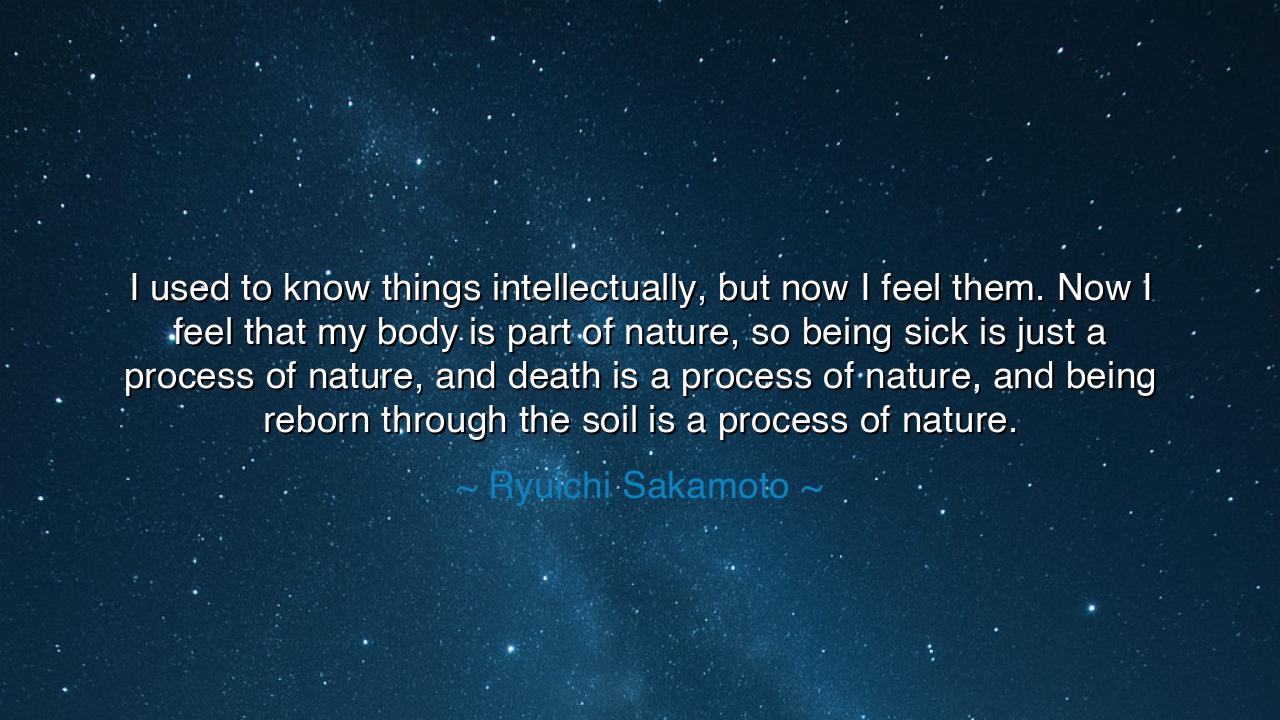
I used to know things intellectually, but now I feel them. Now I
I used to know things intellectually, but now I feel them. Now I feel that my body is part of nature, so being sick is just a process of nature, and death is a process of nature, and being reborn through the soil is a process of nature.






“I used to know things intellectually, but now I feel them. Now I feel that my body is part of nature, so being sick is just a process of nature, and death is a process of nature, and being reborn through the soil is a process of nature.” Thus spoke Ryuichi Sakamoto, the composer whose music bridged the worlds of sound and silence, technology and spirit. In these words—spoken near the end of his life—he gives voice to the sacred realization that lies beyond thought: that knowledge of the mind must one day yield to wisdom of the heart. For to merely understand life is to stand at its surface; to feel it is to dissolve into its vastness.
The origin of this reflection rests in Sakamoto’s final years, as he faced the illness that would one day claim his body. Throughout his life, he had been a thinker, an innovator—a man who studied, questioned, and sought to comprehend. But as death approached, intellect fell silent before the grandeur of existence. What once was concept became experience. What once was philosophy became truth felt in the marrow of being. His sickness, once seen as tragedy, revealed itself as participation in a greater cycle—the eternal rhythm of nature itself.
When Sakamoto says, “my body is part of nature,” he does not speak poetically, but with the clarity of one who has seen beyond illusion. He recognizes that man is not separate from the earth, but an expression of it—a wave in the ocean of creation. The same forces that sculpt the mountains and stir the tides flow through our veins. Sickness is not an enemy, but a rebalancing of elements. Death is not destruction, but transformation. The body returns to soil, the soil nourishes new life, and in that exchange, eternity reveals itself.
This wisdom is not new, though it must be rediscovered by every soul. The ancient Stoics taught that to live well is to live “according to nature.” The Buddha spoke of impermanence, the ceaseless arising and passing away of all forms. And the poets of Japan—like Bashō, the master of haiku—saw beauty not in permanence but in decay: in the falling leaf, the fading blossom, the snow that melts by morning. Sakamoto’s words are born from this lineage of understanding, but deepened by the intimacy of experience. He does not admire nature from afar; he feels himself to be nature. His illness, his fading strength, his music—all are movements within the same eternal harmony.
Consider the story of Leonardo da Vinci, who in his final days ceased painting and turned instead to the observation of rivers, clouds, and bones. He wrote, “Everything comes from everything, and everything returns to everything.” Like Sakamoto, he saw that to die is not to end, but to return. The artist and the philosopher, in their final moments, often come to the same truth: that life’s beauty lies in its impermanence, and that peace is found not in resisting change, but in surrendering to the flow of nature’s will.
Sakamoto’s revelation offers a powerful lesson for the living. We, who rush to control our lives, to master the body, to defy time, forget that we ourselves are time embodied. We are processes, not possessions. To fight decay is to fight the essence of existence itself. But when we accept that life and death are one continuous movement, fear loses its power. In that acceptance, gratitude awakens: gratitude for breath, for sickness that teaches humility, for endings that make way for beginnings.
The lesson, then, is this: move from knowing to feeling. Let knowledge ripen into wisdom through the experience of being alive. When you are sick, see it as the whisper of nature calling you to stillness. When you age, see it as the body’s way of returning to its source. When you die, know that you are not vanishing, but transforming—becoming soil, air, water, and song once more.
So, O seeker of peace, remember the teaching of Ryuichi Sakamoto: do not merely think about nature—be it. Feel the wind as your own breath, the soil as your own flesh, the river as your own pulse. In doing so, fear will fade, and death will lose its sting. For he who knows with the mind may doubt—but he who feels with the spirit will see that there is no death, only the endless music of being, playing on, forever and forever.






AAdministratorAdministrator
Welcome, honored guests. Please leave a comment, we will respond soon